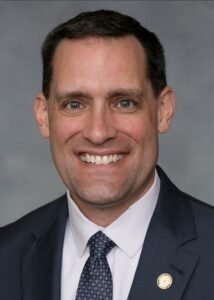Last week Sen. Graig Meyer (District 23) released a digital ad showing two people stopped by the police for using pot. The Black user is arrested and hauled off to jail; the white user is let go and heads to the golf course.

Meyer is the lead sponsor of Senate Bill 346, which would legalize and tax marijuana in North Carolina.
We spoke to Meyer about the video and
How did you come up with the idea for “Two Stops?”
Because I am in a relatively safe district, I try to use my campaign’s resources to find new ways that I hope will lift up all Democrats. Two years ago, we put together an ad (The Beacon) that was intended to demonstrate the ways Democrats can message in a positive way all the things we can do for North Carolina.
That ad took off on social media and so this year we wanted to do something similar. My team (Jeremy Borden, Simon Palmore and Kym Meyer) sat down with our filmmaker (the amazing Frank Eaton) to think about how to expand this work. We wanted to focus on topics where Democrats have the opportunity to make real change for North Carolinians that aren’t currently being much talked about. And in particular we wanted to find ways to show folks who may be unsure if they are going to vote (young voters and voters of color in particular) why voting can really matter to issues that impact them. Marijuana policy checked all our boxes and so we began to brainstorm an ad campaign.
There are so many different issues to highlight with Marijuana policy. The farming and economic development potential is huge. The possibility of reinvestment in communities hurt by the war on drugs is central to a bill I filed last year. Ultimately, we decided to start by highlighting the pervasive racial injustice that flows from differential enforcement of the laws we have on the books across racial lines. This is a topic that is deeply important to me. It’s also a story that everyone knows about, but no one really likes to speak out loud.
Once we had that central concept the ad evolved in twists and turns. Our team has an amazingly fun collaborative process, we throw out new ideas, shoot them down, test them with others, see what resonates on the screen and then start all over again. Frank’s artistic genius is amazing to work with, and he has a level of perfectionism that kept us all on our toes. We had to line up actors, find filming locations, track down things like police gear and golf gloves, wait for the perfect lighting at sunset for key shots and more. Ultimately our campaign manager, Jeremy Borden, became one of the two main actors in the shoot- something we didn’t anticipate, but we appreciate his goofy golf shot.
What has the reaction been?
In many ways the reaction has been incredible! The video has accumulated over 4 million views across platforms. Democratic messenger Adam Parkhomenko was the first person to take it viral. It really picked up steam when black folks started sharing it, including MSNBC anchor Joy Reid, civil rights attorney Ben Crump, and comedian and radio host DL Hughley. The reaction we’ve gotten from Black folks has been to the tune of, “This is true, and more white politicians need to tell this story.” And they’re right.
At the same time, the reaction from elected leaders in North Carolina has been muted at best. Despite the popularity of the ad, and the fact that the polling on this issue is in our favor, very few leaders have embraced the ad as something that can help us reach a new audience this November. Behind the scenes other legislators have told me they like the ad, but don’t feel comfortable sharing it- and that goes even for legislators in comfortable districts. I truly think this is a mistake. The Democratic party has spent the past decade playing it safe and becoming more and more sanitized. And at the same time we have been losing election after election. I really hope we can start to see a little more courage to try something new this election cycle. We can’t just be the party that is against Mark Robinson. We have to be the party that is for things. And here, we would be for something that the public is already supporting.
What could North Carolina do to lead on this issue?
Legalization has happened in a number of states, and one great opportunity we have is to learn from and improve upon their experiences. Most peoples major concerns about legalization are related to how it would be regulated, which is completely understandable. We can build on best practices from previous states, as well as what we’ve learned from public health efforts to minimize tobacco and alcohol abuse. If we do it well, we can have a system that minimizes teen use, driving while high, and smoking in public.
I very much want us to use the revenue from cannabis to reinvest in communities hurt the most by drugs and mass incarceration – especially black communities. My bill has three pathways for this reinvestment. We would use a Community Reinvestment and Repair fund for housing assistance, re-entry supports for people getting out of prison, scholarships for low income students, grants for community based organizations, and legal aid. A Social Equity Fund would provide no-interest loans to folks from marginalized communities who wanted to farm or produce cannabis products. And an Education and Technical Assistance fund would provide education and training for people from marginalized communities that want to work in the industry.
Tell us more about S. 346, the Marijuana Justice and Reinvestment Act.
Our bill would be the best in the country for fully legalizing marijuana for adults 21 and over.
To get this right, we have to be smart and strategic on a range of policy areas related to legalization (including decriminalization), law enforcement, public health, taxation, and reinvestment.
We’re in a terrible situation today with an illegal marijuana market and an unregulated CBD market. It’s way too easy for folks to get Delta-8, TCHA and other cannabis products that need significant regulation. Marijuana is being widely used openly and in the right places and with the right people — people who are white or have privilege. We need to fix all of that by legalizing adult consumption and regulating the growth, production and sales.
My bill has significant public health protections. It prohibits smoking in public places. It prohibits driving under the influence. And because we should legalize it without glamorizing it, my bill prohibits advertising of cannabis products. If ever there was an industry that doesn’t need advertising, this is it.
One thing that I might try to add to the bill is a retailing system similar to our State ABC stores, so that we have close regulation of purchases. That really works for our alcohol sales, because North Carolina has one of the country’s best ratios of high tax revenue to low alcohol abuse. We should try to repeat that with cannabis.
This is how we make sure that we’re legalizing this drug, not glamorizing it.
In 2020, Gov. Roy Cooper convened the North Carolina Task Force for Racial Equity in Criminal Justice, which was co-chaired by Supreme Court Justice Anita Earls and Attorney General Josh Stein. What did it find?
The task force covered a lot of ground, with one of their recommendations being a call for the potential legalization of marijuana as a solution to the racial justice inequities.
I’ve been working with Attorney General Josh Stein on marijuana policy for several years and I love his quote in the report: “You cannot talk about improving racial equity in our criminal justice system without talking about marijuana.” That was four years ago, and unfortunately we haven’t seen much follow through.
The report found that 63 percent of the more than 10,000 convictions that they analyzed for simple possession of marijuana in North Carolina were people of color even though they are only 30 percent of the population and research documents that marijuana use is at roughly equal percentages among Black and white populations.
The task force recommended:
- Decriminalizing the possession of up to 1.5 ounces of marijuana by making such possession a civil offense and expunge past convictions through an automatic process.
- Convening a task force to study legalization and the pros and cons;
- Making the lowest law enforcement priority felony drug possession arrests;
- Making marijuana possession arrests a low priority for law enforcement;
- Recommending to local prosecutors to immediately make possession charges and arrests a low priority.
What can people do to support this or learn more?
The first thing people should do is visit our legalization site, which has links to a number of resources, including S. 346, the Task Force’s Report on Racial Equity, and the North Carolina Sentencing and Policy Advisory Commission’s Report on Marijuana Convictions and Race.
We need help getting this message to people beyond the social platforms, so if you’re so inclined, a donation of any size would go a long way.
Finally, people who support legalization need to make sure their elected officials and candidates for political office this November know their stance. This is a winning issue that North Carolina Democrats shouldn’t run away from it. Hearing from supportive voters can really help move the needle.
Anything else to add?
I think there are some reasons for Democrats and proponents to be concerned about S.3, the medical marijuana bill being pushed by some Republicans. It would set up total corporate control of the medical market and what we’ve seen in other states is those companies then look to dominate the marketplace once full legalization occurs. We need to make sure North Carolina farmers and small businesses benefit, as well as communities of color, and that could make those long term goals more difficult.
Also, as it is currently drafted, the medical marijuana program would actually cost the state about $38 Million per year. There’s no reason to take a loss on legalization.
The N&O covered this recently. I’d like to engage more of my constituents and Democratic colleagues on this as this new legislative session gets started.
Let me know what you think by email at [email protected] and please find out more on our website.

